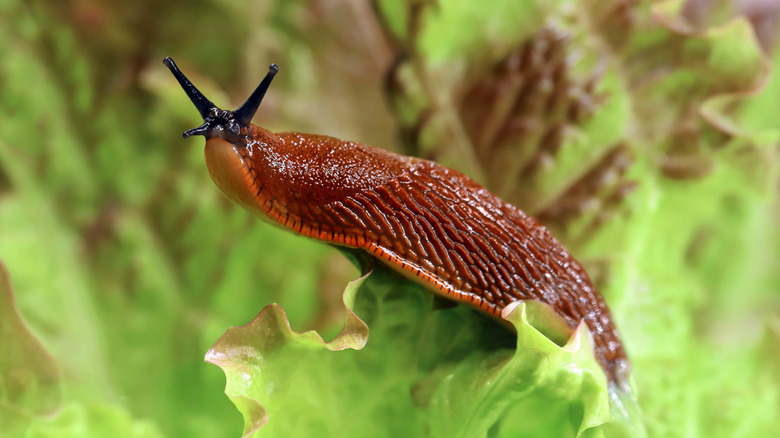The Ingredient That'll Control Snails And Slugs In The Garden
Snails and slugs might be cute in children's books, but they're not a welcome sight in the garden. These pests like to nibble away at flowers, leaves, and fruits, leaving behind unsightly holes. If you don't want to share your landscaping or vegetable patch with these troublemakers, then you need to find a way to remove them, and fast. If you have tried a series of humane ways of deterring these pests and they haven't worked — such as creating a slippery WD-40 barrier or using a cardboard box to catch them — then it might be time to escalate. However, that doesn't mean you must use harsh chemicals or harmful repellants. Instead, you can use all-natural vinegar.
Vinegar can be used as a natural pesticide since it's made of acetic acid, which will kill them on contact. And since most people have a bottle handy in their pantry or laundry room, it's an easy hack to try when you spot one of these slow-moving pests in your yard. Here's how to do it.
How to use vinegar to kill slugs and snails
While vinegar will fix your slug and snail problem, there are some caveats to keep in mind. First, you must spray it directly on the pest for it to work. This might not seem too big a problem until you remember that vinegar can burn plants and grass and destroy their cell membranes. Because of that, you can only spray the slugs and snails in the dirt or on the sidewalk, not the ones already on your plants. Secondly, this isn't a hack for the squeamish. The acid will dissolve them, forcing you to clean up the mess left behind. However, some gardeners recommend leaving them in the garden, as they might deter other slugs and snails from coming in.
If you're okay with those caveats, then it's time to make your solution. You want to water down the vinegar to make it a little less acidic, making it safer to use around plants. Mix a 1:1 ratio of water and vinegar in a spray bottle and shake it to combine it well. Then, have the bottle on you every time you venture into the garden, allowing you to spray down any pests you see. You can also saturate the area around your plants to deter the slugs from approaching, taking special care not to hit the leaves or stems.
